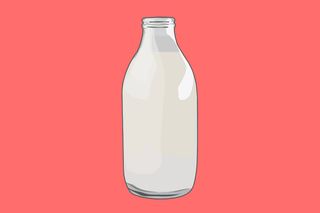
Research Clears Milk, Dairy of Contributing to Childhood Obesity
Instead, they may actually may have protective benefits for obese kids.

After reviewing 27 years worth of scientific data, researchers from the European Association for the Study of Obesity have concluded that milk and dairy products do not in fact play any role in the promotion of obesity in children when consumed within appropriate quantities. On being presented at the 2018 European Congress of Obesity, it was affirmed that no “underlying mechanistic rationale” supported the theory that milk and dairy products were connected to childhood obesity in any way.
“An important finding was the consistency of findings across different types of milk and dairy products and age groups,” explains Dr. Anestis Dougkas, Institut Paul Bocuse, Ecully, France lead researcher.
Milk and dairy products such as yogurt and cheese are known to provide various essential nutrients, such as calcium. Previously there was a belief that milk and dairy products were not directly associated with obesity on their own, however it was widely debated that they promoted obesity in children.
The team analyzed data from 95 studies between 1990 and 2017, which involved a total of over 2,00,000 individuals. They considered the effects of both full and low fat milk as well as other dairy products intake on obesity in childhood, as well as the possible mechanisms that may affect body-weight regulation.
They concluded that there was no evidence to suggest age or body fatness in children are associated with milk and dairy products. Even with different varieties of products the results were consistent. Only 9 of the 95 studies showed any positive association between milk and dairy products, and obesity. However, there was a lack of data when it came to children between 1 and 5 years of age.
“There is no harmful effect on obesity from incorporating dairy and especially milk in the diet of children and adolescents. These results call into question current recommendations that restrict consumption of milk and dairy products. The new and emerging range of products (including plant-base alternatives being used as dairy milk substitutes) have yet to be evaluated in scientific studies,” they conclude.
In fact, another study conducted by researchers at the University of Texas Health Science Center at Houston, have found that obese children who consume the optimum two servings of any type of cow’s milk are more likely to have lower fasting insulin which indicates better blood sugar control in the body.
“Our findings indicate that obese children who consume at least the daily recommended amount of milk may have more favorable sugar handling and this could help guard against metabolic syndrome,” said Michael Yafi, M.D., study author and Professor of Pediatrics at McGovern Medical School at UTHealth. “Worryingly, only one in 10 young people in our study were consuming the recommended amount of milk.”
Metabolic syndrome is the presence of at least three of the five conditions that are responsible for increasing the risk of diabetes, heart disease and stroke. They are high levels of blood sugar or triglycerides, high blood pressure, excess belly fat, and low “good” cholesterol levels. Obesity is closely linked to the development of this metabolic syndrome.
Researchers add how more and more parents are opting out of or limiting how much milk they give their kids, and encourage parents to provide their kids with a healthy amount of milk daily.
The study involved 353 obese children and adolescents for a 2 year long chart review. The team took into account daily milk intake, type of milk, fruit juice intake, as well as other sugary drinks consumption.
They discovered that on an average only 23 of 171 children were consuming the daily recommended two to three cups. They found that children who had an intake of less than one cup of milk daily showed significantly higher levels of fasting insulin as compared to their counterparts who drank at least two cups.
“The link between sugary drinks and childhood obesity is well-documented. Vitamin D deficiency has also been connected to this. By contrast, from a preventive perspective, our pilot study suggests that milk intake is not only safe but also may protect against development of metabolic syndrome,” explains Mona Eissa, M.D., M.P.H., Ph.D., Professor of Pediatrics and Adolescent Medicine at McGovern Medical School at UTHealth. “Yet fewer children are drinking enough, especially with growing concerns over fat content and dairy intolerance. Only a small percentage of children are actually intolerant to milk so parents shouldn’t be afraid of milk or cut back on it.”
Related


Genetic Schizophrenia Risk Declines When the Mother’s Pregnancy Is Healthy
